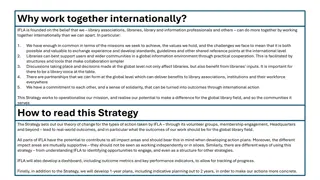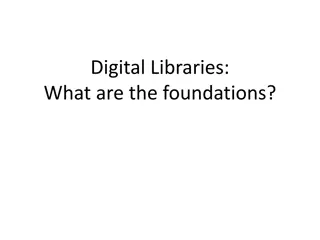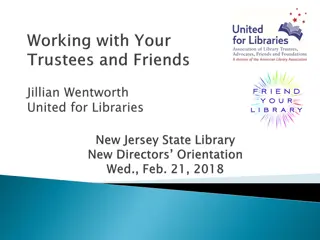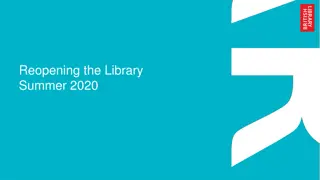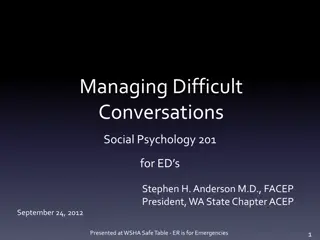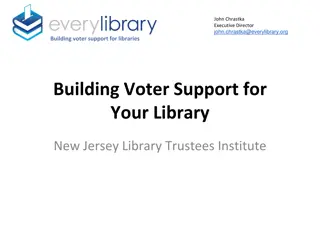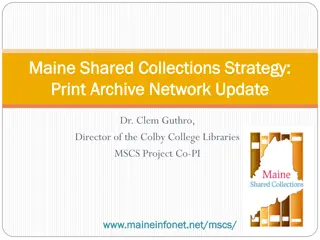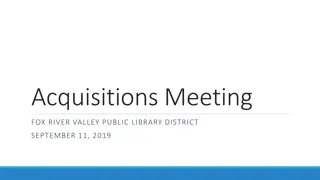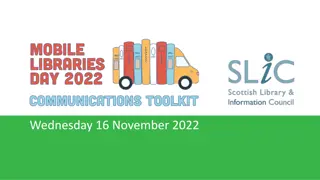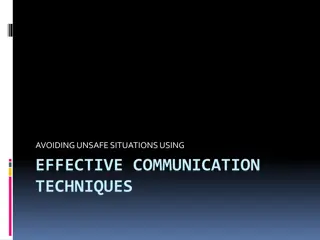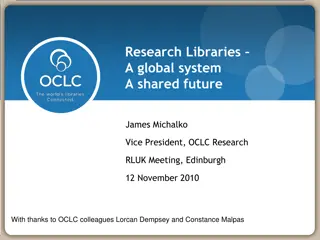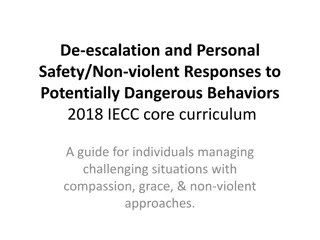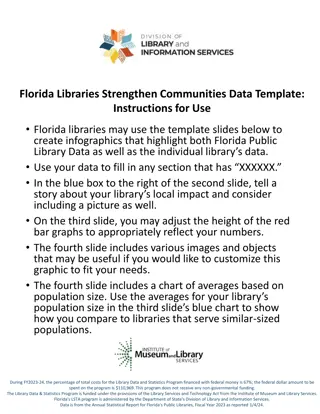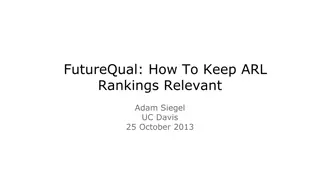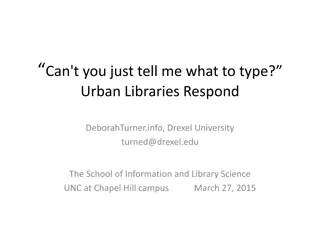Effective Strategies for Handling Challenging Situations in Libraries
Learn essential de-escalation tips, communication techniques, and responses to common scenarios faced in library settings. Explore tactics like active listening, maintaining calmness, and setting boundaries to navigate issues effectively. Gain insights into promoting diversity and addressing concerns with empathy and professionalism. Equip yourself with practical skills to manage conflicts and foster a positive library environment.
Download Presentation

Please find below an Image/Link to download the presentation.
The content on the website is provided AS IS for your information and personal use only. It may not be sold, licensed, or shared on other websites without obtaining consent from the author. Download presentation by click this link. If you encounter any issues during the download, it is possible that the publisher has removed the file from their server.
E N D
Presentation Transcript
De-escalating Material Challenges: Hands on Practice Betsy Mahoney, Assistant Director SMRLD betsymahoney@smrld.org Julia Nephew, Children s Services Specialist Addison Public Library nephew@addisonlibrary.org
De-Escalation Tips Be Calm Be Patient Be Neutral Facial expressions Body Language
LOWLINE Listen to what the issue is and the person's concerns. Offer reflective comments to show that you have heard what their concerns are. Wait until the person has released their frustration and explained how they are feeling. Look and maintain appropriate eye contact to connect with the person. Incline your head slightly, to show you are listening and give you a non-threating posture. Nod to confirm that you are listening and have understood. Express empathy to show you have understood. https://www.health.nsw.gov.au/mentalhealth/psychosocial/strategies/Pages/managing-anger.asp
Scenarios Thank you to Joyce McIntosh, The Office of Intellectual Freedom, ALA, and the Freedom to Read Foundation, for sharing scenarios
Scenario 1 Brian is an eleven-year-old boy who comes to the library every day after school until his mother picks him up. His mother has made it clear to Brian that she does not want him to check out R-rated movies. One day when she picks him up at the library, she finds an R- rated video in his backpack. She is very upset and immediately approaches you to say that she needs the library staff to stop Jason from checking out R-rated movies. PG-13 movies are OK, but not those with an R-rating.
Response Remind the parent that she is responsible for working with her child to ensure he is checking out movies that she feels are appropriate. When Brian got his library card, his mom or another parent signed an agreement taking responsibility for his library selection. The librarians won t censor what each patron is checking out and we will carry some movies that are appropriate for her son and some that are not.
Scenario 2 The collection manager shares the final statistics of their diversity audit on purchased materials to the public. The library said they would use the 2020 census data as a minimum benchmark for the percent of books featuring diverse characters. After sharing the final numbers, someone asks why the library is purchasing so many books with Asian American characters if the community has such a small population of Asian Americans?
Response There are many factors at play. One would be publishing, news trends, world events, and award winning books featuring Asian characters. It is also important to remember that one year of purchasing may not significantly change the overall collection. While a library s collection should be reflective of a community, it should also stretch the public s understanding of other cultures.
Attendee Responses Respond with compassion, ask what can we do to meet your need and what are those things you would like to see from the library.
Scenario 3 The library where you work has a nice glass case in the entry where local groups often display crafts and interesting collections. The local high school has an art display and three paintings are displayed in the case. One is a painting of George Floyd. A patron complains that the other side isn t represented. If you move the painting to an office where people who ask to see it can see it, no one will be offended. That seems like the best solution for everyone and the least likely to create problems.
Response Have an exhibit space policy. It doesn t have to be some additional rule that the public sees, just have it and know where it is. Have a manager or director explain that the library s collection reflects many points of view. The library has materials that support law enforcement. Library policy, as well as the Library Bill of Rights*, does not require that staff place them next to the painting. Communicate this message to your staff so they have a way to respond, whether that s an email, a memo, just something so people aren t caught off guard. *Library Bill of Rights https://www.ala.org/advocacy/intfreedom/librarybill II. Libraries should provide materials and information presenting all points of view on current and historical issues. Materials should not be proscribed or removed because of partisan or doctrinal disapproval.
Attendee Responses Exhibits change monthly, so by the time the complaint process is done the exhibit is already down. Protecting access not defending content
Scenario 4 Addy is a high school student working as a page. She loves shelving the picture books. Lately she is very concerned about one of the picture books, Julian Is a Mermaid. She has seen small children take it out of the picture book shelves, open it up and then look puzzled by the content. Often they ask a parent to explain. She has seen how parents become embarrassed and quickly shove the book back in the bin or put it on top of a high shelf. Amy has a solution. Why not label the book to go in the Parenting Collection? That way it will be found by those who are looking for this type of book, not by small children. Isn t it more appropriate in that collection so that a parent can explain about transgender people? Amy will suggest that to the children s librarian.
Response A couple things come into play here. First, it s the parent s responsibility to help the child determine what to view and to talk to the child about what he or she views. Second, we provide the book, not judge the content. And last, it would make sense for Addy to talk to the children s librarian . the librarian may determine that the book isn t a picture book. If it is, it makes sense to keep it where it is. If it s not, and it s more of an educational book then it may get moved.
Attendee Responses Moment for parents and children have a moment to discuss differences, how to grow
Scenario 5 The principal of a public school receives an email from a parent whose child attends the school. This parent objects to Melissa, a book about a transgender child. The supervisor instructs the librarians at the school to remove the book from the library shelves. The librarians know that the principal is not following policy, which would be to require that the parent fill out a reconsideration form and go through the challenge process. The librarians want to keep their jobs. What can they do?
Response The school librarian can remind the principal that the Board has approved a policy about how to deal with requests for removing materials. No one is encouraged to put their job at risk.
Attendee Responses Document the conversation in writing notes, maybe another staff person
Scenario 6 A group, called Family Values for Family Libraries, is protesting the presence of graphic novels in libraries. They do not see any value in the comic book format and assert that the graphic violence and sex are harmful to the young teens who frequently check out these books. They have specifically targeted Crying Freeman, a series of graphic novels published in Japan. Jenna works in Technical Services and prepares books for the bindery. She recognizes one of the books in her bindery stack as being in that series. When she checks the catalog, she discovers that all the other titles in that series are missing so the one she has in her bindery stack is the only active copy. In flipping through the book, she has to agree that it is extremely violent and the sex is perverted, to say the least. Jenna realizes that the book is in pretty bad shape so she could discard it rather than send it to the bindery. How could this group make a fuss about a book that the library no longer owns?
Response Well . we aren t going to ditch the Graphic Novel collection. If you don t have any of the series, and there isn t a hold list, you may choose to get rid of it. If it s a popular, circulating book, you keep it. An additional thing I would do is communicate with a member of Family Values for Family Libraries. We want to provide books that they want to see. Our goal is to provide something for everyone, not limit or keep any group from having materials.
Scenario 7 As a patron heads out the door, he tells you how upset he is that this book is on display in a busy area. He believes this belongs in an adult bookstore not the library.
Response I remind attendees that it s our role to provide access to information, not defend content. If the patron wants to do more than complain, I invite them to speak with a supervisor or the librarian in charge, or the director. I also let them know they can fill out a materials reconsideration (challenge) form.
Scenario 8 A librarian in a local Teen Services department had a patron request a list of people who had checked out Gender Queer. The librarian explained that it is illegal to share what s on another person s record. The patron didn t believe her! What did she do to prove this for the patron?
Response I remind people that our library records are not publicly available and are covered by The Library Records Confidentiality Act {75 ILCS 70/1 et seq.} which states that the records of patron transactions and the identity of registered library patrons is confidential material. This is a state law. You can find a copy of the Illinois Compiled Statutes online.
Scenario 9 The Youth Services staff has chosen the book When Aiden Became a Brother by Kyle Lukoff for the library s storywalk. After the book has been installed, a parent comes in, very distressed about the book s LGBTQIA themes. The parent does not believe it is appropriate for the storywalk and the bright illustrations make it impossible for parents to steer their children away from the storywalk.
Response Listen to the complaint and explain that the stories rotate in the storywalk. The stories told should be reflective of the whole community. Hopefully the parent will be happier with the next month s choice. You could also offer to gather library books that the parent would consider more appropriate for their child.
Training: Staff and Board Normalize talking about Intellectual Freedom issues at every level of your organization. De-escalation and good customer service go hand in hand Practice makes perfect. Train those neuropathways!
Things to consider: Do you know where your policies are? Does everyone have access to your policies? Are you the best person to handle book complaints? Do you know who to call for backup? What are the procedures if a book challenge is filed? When was the last time anyone reviewed/updated your policies and procedures?
To report a challenge or donate to help librarians To report a challenge or donate to help librarians facing challenges: facing challenges: ALA Office of Intellectual Freedom, https://www.ala.org/aboutala/offices/oif The Freedom to Read Foundation, https://www.ftrf.org/ Unite Against Book Ban, https://www.uniteagainstbookbans.org Illinois Library Association, https://www.ila.org/initiatives/banned- books-week/take-action
Thank you! Betsy Mahoney, Assistant Director SMRLD betsymahoney@smrld.org Julia Nephew, Children s Services Specialist Addison Public Library nephew@addisonlibrary.org





